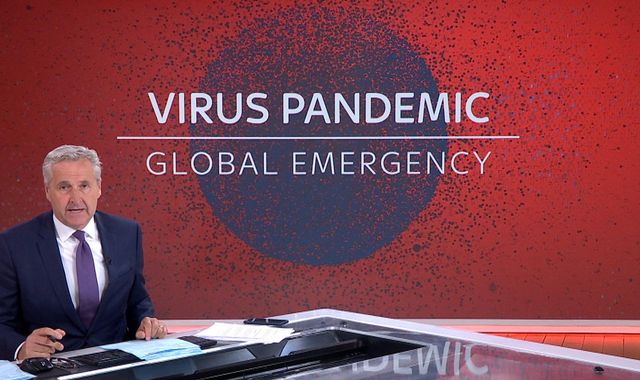Coronavirus: Mark Austin on why anger towards TV journalists may be misplaced
Written by News on 27/04/2020
Television journalism is imperfect.


Sometimes we may miss the right stories, overemphasise the wrong ones, occasionally ask trite questions or fail to challenge dubious claims.
During the coronavirus pandemic – with a mass of data, unattributable briefings, unnamed sources and a rapid turnaround of often complex information – mistakes can be made. Hopefully, they are few and quickly corrected.
And in this crisis, journalism collides with other examples of the imperfect: science, politics and yes, even medicine.
This ghastly virus has led to people watching mainstream TV news and viewing mobile and website content in far greater numbers than recent years.
But why, according to a recent poll, has faith in TV journalists taken a hit in the middle of the COVID-19 outbreak?
It was only one poll, but it bothers me. Trust is our lifeblood and we cannot thrive without it.
An admittedly unscientific study of the criticism on social media over the last few days is instructive.
About a third of anger is about TV journalists being too critical of the government.
There is a strong feeling among some out there that journalists are “missing the mood” of the country and that what’s needed is more support for a “government doing its best… a more constructive contribution, more hope, optimism and faith”.
While I get the emotional appeal of the argument, it rather fails to take into account the essential role of journalists, which is to ask sometimes awkward questions and try to hold government ministers to account.
We’re not cheerleaders.
That doesn’t mean constant carping and criticism, but it does mean challenging ministers who should take responsibility when things appear to be going wrong.
So if a minister over-promises and under-delivers on protective equipment for NHS staff, and nurses or carers tell us they feel ill-equipped and vulnerable, our task is to ask why it’s happened and when it will be fixed.
It’s not hostile, it’s not politically driven, it’s our job.
If we’re told we’re among the best-prepared countries for such an epidemic and then the testing infrastructure can’t cope, we should ask the question… why?
And as deaths climb in care homes, there will be many families asking us to ask the government why the elderly and vulnerable are not better protected.
Interestingly, much of this type of criticism comes from veterans of the Brexit battle who seem to think that this crisis offers an opportunity to renew recent grudges with the media.
My question to those critics is this: do you honestly think we wouldn’t be asking exactly the same questions, in exactly the same way, to a Labour government?
“Oh, but this is a national crisis that requires a national effort,” comes the cry.
But that doesn’t mean journalists should suspend scepticism and curiosity. In fact – with hundreds dying every week – it almost certainly requires more interrogation.
It may seem irksome and irritating, but grown-up politicians will know it comes with the territory and our democracy is all the better for it. Accurate, impartial, rigorous journalism props it up.
When British troops were sent to war in Iraq, by a Labour government, would it have been better if journalists had asked no questions about the lack of adequate equipment or, about the premise of the war in the first place?
Roughly another third of the anger against TV journalists is about not criticising the government enough.
For a while this was led by Alastair Campbell, berating journalists for the soft questions being asked at the daily news briefings.
But Mr Campbell is a former Labour spin doctor who’s still spinning hard. He’s good at it and he will acknowledge that politically loaded criticism and point scoring is the role of the official opposition, not journalists.
As for the last third – that is, broadly speaking, people who feel the news is just too grim.
They say they never see any positive or uplifting stories and then, in the same sentence, add: “But I’ve stopped watching really.”
Were they still to watch, they would see stories every day on all the main news outlets about our NHS heroes, carers and public service workers – about astonishing recoveries and patients being clapped out of hospital, about acts of kindness by neighbours, about the fight for a vaccine, and about people like Captain Tom Moore raising amazing amounts of money for charity.
The real problem is this: we are in the midst of a crisis that impacts every single person in this country and that scares many of us.
And, unlike other world crises, we really have no idea how this will turn out. We really don’t know how many people will die, we can’t be sure when we will find antiviral drugs and a vaccine, we can’t be certain it won’t come back, we don’t know what life will be like in six months, and whether we will still have a job or a business.
Our instinct is to want to be comforted by the thought that it will be okay – that our scientists, public health officials and government leaders are in control and know exactly what they’re doing.
They may well do – the whole country certainly hopes so. But when journalists, on television every day, repeatedly raise perfectly legitimate questions about it all, the result may be an unsettling and unwelcome message. But it’s not one for which the messenger deserves to be shot.
As I write this, I see that Ofcom is tracking trust in the main broadcasters at between 72% and 79% in their weekly COVID-19 tracker, so clearly all is not lost.
We must be heartened by the fact that this country is blessed with some of the best scientists, doctors and nurses in the world.
We also have some of the best journalists, and they’re only trying to do their job.
(c) Sky News 2020: Coronavirus: Mark Austin on why anger towards TV journalists may be misplaced






